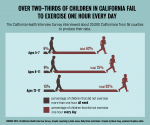UCLA researchers found two-thirds of children and four-fifths of teenagers in California fail to exercise for the recommended amount of one hour per day.
The study examined what environmental factors might discourage children from exercising. Susan H. Babey, a senior research scientist at the UCLA Center for Health Policy Research who authored the study, said that children are more likely to exercise if they live near a safe area to play, such as a park or quiet street. Likewise, they are less likely to exercise if they live in an unsafe neighborhood or near a busy street, where parents might have more safety concerns about letting their children play unsupervised.
“In many cases, children have less freedom to roam and be active outside the house,” Babey said. “And of course, there’s all the digital technology that has had an impact as well.”
The study used data from the 2013-2014 California Health Interview Survey, a large telephone survey of California residents. The survey collected data on the weekly exercise levels of children aged 5 to 11 and adolescents aged 12 to 17.
Broader issues that reduce exercise include an increased reliance on automobile transportation, said Michael Jerrett, professor in the department of environmental health sciences. Sprawling cities increase the use of cars and make it difficult to rely on walking or bicycling as a form of transportation, he said.
“We are currently experiencing a global pandemic of physical inactivity,” Jerrett said.
Low levels of physical activity during childhood can lead to serious health complications as adults, said Jerrett. He said exercise can help prevent metabolic diseases, cancer, high blood pressure, osteoporosis and even depression.
In order to prevent these diseases, parents should have a more active role in encouraging exercise among children, Jerrett said. He said there are many ways parents can encourage children to exercise outside more often, such as the use of “utilitarian exercise,” in which both children and adults become more active in necessary daily activities. For example, he suggests parents walk their children to school instead of driving.
He also said parents should encourage their children to participate in team sporting events. Since sports teams often have regular practices and games in which kids stay active, these teams can help children achieve the recommended amount of exercise.
Allison L. Diamant, one of the study’s co-authors, added that parents can encourage their children to exercise more by serving as role models and exercising themselves.
Diamant also said she thinks neighborhoods should remove physical barriers that prevent exercise. For example, many schools could keep their playgrounds open to the public after school hours to combat limited accessibility to parks in certain neighborhoods. She added she thinks individual cities should also promote safety in local neighborhoods, so parents and children will feel safe while playing outside.
“I feel relatively safe in my neighborhood, but there are a lot of parts of town where people don’t feel safe for a variety of reasons,” Diamant said. “That leads to a decrease in exercise, especially in children.”
Babey also said she thinks schools should focus on improving their physical education programs. She said educators should ensure that the physical activity children participate in during gym class keeps them actively moving.
She said there may be concerns that physical activity could detract from academic work, but this is not the case. In fact, exercise can improve children’s focus in class, which can help improve their grades, she said.
“Recent research shows that physical activity can actually help with the academic goals of schools,” she said.
While Babey said exercise levels have plateaued in the last decade, they are still very far from where they should be. She said she thinks parents and policymakers should incentivize children to go outside and be active in order to minimize health problems and maintain a healthy population.

Good article,Following the advice of this article (google ” How I Helped My Sister Cure Hypertension ” ) for the last six months, I’m well on my way to being in the best health of my life. This is a must read for anyone with high blood pressure.